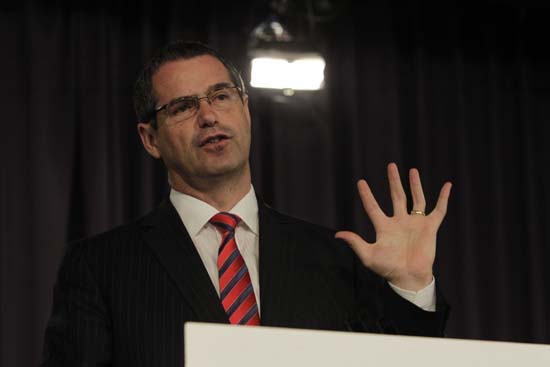
OPINION: It’s a great shame when political and commercial vested interests drown out compelling and principled arguments for free expression in this Australian media reform debate.
Firstly, I declare my own interest as Australia’s correspondent for Reporters Without Borders (RSF) – an interest in free expression and media freedom.
That said, here are my three reasons the Public Interest Media Advocate proposal for control of press regulation deserves a sudden death.
1. It amounts to de facto licensing. I don’t believe the plan was sinister or Stalinist – I just don’t think the policy wonks looked at the impact of the ‘stick’ end of the ‘carrot and stick’ approach to ‘enforced self-regulation’.
As I blogged last week, it would mean ‘death by a thousand consent forms’ for any newspaper/online company who refused to sign up (with $3 million plus turnover). Why?
The Privacy Act exemption for journalism exists for good reason: the Act is designed for government departments, banks, insurance companies and other large corporates and we all know that journalism is not “just another business”.
Those bodies have predictable dealings with customers and are not in the business of publishing stories about them.
The revised Privacy Act – effective from 2014 – gives the Privacy Commissioner tough new powers to audit corporations, wielding civil penalties of up to $1.7 million (See Mallesons brief).
A relatively small newspaper group would reach the required $3 million annual turnover threshold to qualify and would be crippled by the paperwork involved in complying with the Privacy Act – consent authorities for all personal information collected – the very lifeblood of community news reporting such as people’s ages, workplaces, political and union affiliations.
It would require consent from anyone identifiable in photographs – including those in the background. It would thus set up a statutory market differentiation between such a news organisation and its competitors – other media not subject to the Act, including newspaper groups in a press council, broadcast media not subject to this provision, and smaller media of all types exempt from the Privacy Act threshold.
Law firm Minter Ellison issued a release on March 14 with the following stark advice: “The potential loss of the media exemption in the Privacy Act could make it difficult, if not impossible, for news media organisations to effectively continue their operations.”
So, it’s not a ‘stick’ but a shotgun to the head of newspaper companies to be in a registered press council or be out of business. That’s licensing – and ‘prior restraint’ on a news outlet’s ability to publish – a situation abhorrent to our system of law for centuries.
2. The Bill’s very terms are self-defeating and damage free political speech. Section 14 of the Bill proclaims that nothing within it should counter the High Court’s freedom to communicate on matters of politics and government. But the very mechanism does that in two ways.
Firstly, the overall effect is to force newspaper companies into a regulated ‘self-regulator’. The alternative, as per point 1 above, is almost certain death.
Newspapers have long been a key forum for political and governmental debate in our society. How informed about candidates for the upcoming election would voters in Tamworth be without their Northern Daily Leader and its website? Well, that would be the plight that community would face if its owner – Fairfax – decided to leave the Press Council on principle, could no longer afford the membership fee, or was expelled.
Secondly, the very Privacy Act that is being held as the threatened ‘stick’ deems ‘trade union membership’ and ‘political affiliation’ as ‘sensitive information’ – subject to even more red tape. The mechanism forces a recalcitrant news organisation into a disadvantaged position in its election coverage because its hands would be tied by this level of bureacratic compliance.
This would mean – at the very least – that the flow of political and government opinion in the community would be unacceptably delayed by privacy consent paperwork. Imagine the impact of such a brake on the web-based and social media divisions of such a newspaper – getting consent from everyone identifiable through a comment thread! This would give ample ammunition for a High Court challenge.
3. The instrument has already damaged Australia’s standing as a free Western democracy. We have no written constitutional free expression protection, which sets us apart from other democracies. Both Communications Minister Stephen Conroy and Prime Minister Julia Gillard cited RSF’s World Press Freedom Index in recent days, using the argument that Finland is in number one position there despite having a statutory mechanism for its press regulation.
Perhaps – but Finland also has a section in its Constitution guaranteeing free expression and the free flow of information so all laws are formed and applied against that backdrop.
It also lacks the hundreds of other media laws impacting on free expression that we have in this country which place us at number 26 on that same Index.
We languish there partly because of the very threats to media freedom posed by the recent inquiries into its regulation. The UK’s latest move is also set against a European human rights free expression framework and is a reaction to much more heinous media acts than we have seen in this country.
Australia has spent millions over recent decades ‘counselling’ our Pacific Island and Asian neighbours against exactly these kinds of government interference with a free media – in the form of AusAID training courses and other diplomatic interventions.
Now we send the clear signal that the Australian government is willing to offer a handy lesson in managing adverse publicity – using a cynical device to subject non-compliant newspapers to death by red tape.
There you have it – a vent from someone whose only agenda is to encourage truth-seeking and truth-telling in our society through the long-established right of free expression. Oh, I do have another agenda – preserving an employment market for journalism graduates. And it looks like that challenge may get even harder!
PS. Find an inaccuracy here and I’ll correct it immediately and record that correction in a note below.
© Mark Pearson 2013. Full links can be found here.



